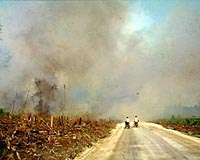| . |  |
. |
Venice, Louisiana (AFP) May 20, 2010 The thick globs of oil now coating delicate grasses along Louisiana's fragile coast threaten a slow and painful death for countless waterfowl, wildlife and their wetland habitat. Cleaning up the maze of marshes, where there's nothing to stand on and shallow-bottomed boats are needed to navigated the narrow channels, is a logistical nightmare. Unlike a beach or rocky shore, crews can't just drive up with a backhoe or a mop. And there are plenty of places for frightened wildlife to hide from rescue workers as the oil slowly smothers them. Experts say the best options may be to simply leave the oil there or, if the clumps are too thick, burn it off. "When you start moving all the grasses and marshes around you might actually cause more damage than letting it biodegrade on its own," LuAnn White, director of Tulane University's Center for Applied Environmental Health, told AFP. "Exactly what will be done really depends on how much really gets in there and how much damage is being done and I don't think we know that yet." Favorable winds and currents have kept the bulk of a massive oil slick from reaching the coast in the month since the BP-leased Deepwater Horizon sank spectacularly some 50 miles (80 kilometers) offshore and set off one of the worst ecological disasters in US history. But with some 49 miles of shoreline now affected, Louisiana Governor Bobby Jindal said more action must be taken to hold back the black tide. "This spill fundamentally threatens Louisiana's way of life," Jindal said after inspecting the thick black oil pushing its way into his state's fragile wetlands. "The oil is here and the time to act is now." Jindal is seeking permission from the US Coast Guard to build "sand booms" to protect barrier islands and has been begging for more boom to be deployed along the coast. Officials have already been dropping sandbags and building temporary dams to protect sensitive areas. The area houses 40 percent of the nation's wetlands which are a major stopping point for migratory birds and provides prime breeding grounds for the fish, shrimp, oysters and crabs that support a 2.4 billion dollar commercial and recreational fishing industry. Coast Guard Captain Edwin Stanton downplayed the current impact as "little" and on a "very small marsh." "It's not going to kill the marsh for ever," he told AFP. The coast guard plans to place containment booms in the marsh, use low-pressure water to flush out the oil and capture the mess using a skimmer and other equipment. As a "last ditch effort," the coast guard was considering burning the affected marshes, Stanton said. "We've done that before, that's an acceptable tactic to remove oil from the marsh, but you can only do that once," he said. "So you want to have a lot of oil before you do it. The marsh grass will regrow." Local leaders and environmentalists were beginning to despair. "Twenty-four miles of Plaquemines Parish is destroyed. Everything in it is dead," Billy Nungesser, head of the parish in southern Louisiana, told US cable news station MSNBC. "There is no life in that marsh. You won't clean it up." "We've been begging BP to step up to the plate," said Nungesser. The slick is "destroying our marsh, inch by inch," and will keep on coming ashore for weeks and months, he said. Greenpeace campaigner Lindsay Allen was equally despondent as she collected samples from a bayou near Venice, Louisiana where thick brown oil coated the shells of crabs and the stems of grasses. "There is no way to cleanup all this mess," she told AFP. "It's too big of a problem." A typical recovery rate for oil spills is about 20 percent. Given how dispersed the oil is in the Gulf most experts expect the recovery rate on this spill to be far lower. BP succeeded Thursday in increasing the rate of oil being siphoned from the burst pipe some 5,000 feet below the surface to 5,000 barrels per day, but it could be weeks before the leak is finally capped and the total amount gushing into the sea could be many times that. "This spill is significant," said Rowan Gould, acting director of the US Fish and Wildlife Service. "In all likelihood it will affect wildlife in the Gulf and the North American continent for years."
Share This Article With Planet Earth
Related Links Forestry News - Global and Local News, Science and Application
 Indonesia probes massive forest corruption: official
Indonesia probes massive forest corruption: officialJakarta, Indonesia (AFP) May 20, 2010 Indonesia's anti-graft commission is investigating rampant corruption in the forestry sector that has cost the state more than 100 billion dollars, an official said Thursday. Corruption Eradication Commission deputy chairman Mohammad Jasin said investigators had found "indications of violations" of forestry rules by 470 companies, mainly miners, operating in Indonesian Borneo. Deforestat ... read more |
|
| The content herein, unless otherwise known to be public domain, are Copyright 1995-2010 - SpaceDaily. AFP and UPI Wire Stories are copyright Agence France-Presse and United Press International. ESA Portal Reports are copyright European Space Agency. All NASA sourced material is public domain. Additional copyrights may apply in whole or part to other bona fide parties. Advertising does not imply endorsement,agreement or approval of any opinions, statements or information provided by SpaceDaily on any Web page published or hosted by SpaceDaily. Privacy Statement |